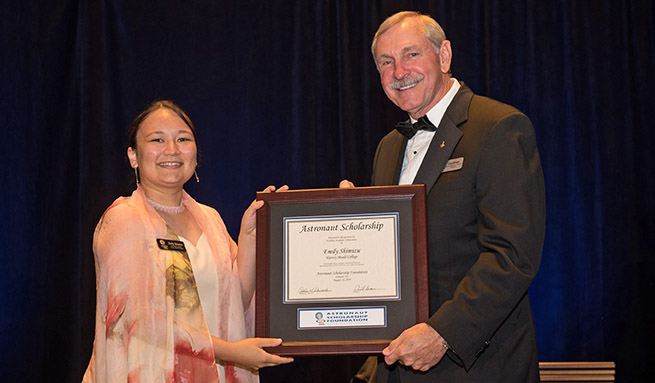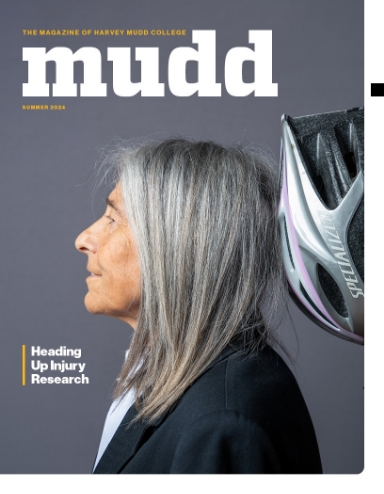Shimizu Named Astronaut Scholar
September 9, 2019
Harvey Mudd College joint chemistry and biology major Emily Shimizu ’20 has been named an Astronaut Scholar for the 2019–2020 academic year by the Astronaut Scholarship Foundation. She is the 26th Harvey Mudd student to receive the honor, which includes a scholarship prize of up to $10,000 and opportunities for professional development and mentoring.
“Besides the scholarship itself, I am particularly excited about the mentoring program,” Shimizu says. “The Astronaut Scholarship Foundation is a very encouraging and supportive community of scholars, who are already helping to advise me this semester as I apply to graduate school to pursue a Ph.D. in chemistry.”
Shimizu says her ASF mentor has given her guidance on graduate schools and has expanded her knowledge of career paths post-graduate school.
While attending the three-day Astronaut Scholarship Foundation Innovators Weekend in August, Shimizu had the opportunity to meet other astronaut scholars and attend the Innovators Gala, which featured Apollo 16 moonwalker Charlie Duke as keynote speaker. Scholars visited the National Institutes of Health in Washington D.C. and attended a National Science Foundation panel on future research funding opportunities, including the Graduate Research Fellowship Program, which Shimizu intends to apply for.
Shimizu was nominated for the Astronaut Scholarship by David Vosburg, professor of chemistry, who has worked with her on numerous projects during her time in his research group at HMC.
Among their research projects, Vosburg has worked with Shimizu on creating a one-step process for the anesthetic lidocaine. The procedure is commonly used in dentistry and will be featured in the Organic II Laboratory course at HMC in the fall. The project is being further developed by collaborators at the University of Guanajuato in Mexico, where Vosburg spent his recent sabbatical working with colleagues on developing environmentally friendly methods of producing new molecules for medicinal, agrochemical, optical and educational applications.
“Emily is an enthusiastic and creative problem-solver who has significant research experience in diverse areas of organic, organometallic and supramolecular chemistry at HMC, the University of South Carolina, the University of Rhode Island and The Scripps Research Institute,” says Vosburg.
During summer 2019, Shimizu interned at the Scripps Research Institute in Florida. Her work in the Renata Lab focused on the chemoenzymatic synthesis of peptides (molecules) gramillin C and fellutamide A. Using enzymes in this synthesis makes the process more step-efficient, says Shimizu.
When Shimizu isn’t in the lab, she’s on the dance floor. As the president of the Claremont Colleges Ballet Company, she teaches weekly ballet classes, organizes trips to see ballet performances and performs with the club. She helped organize the annual Fast Forward student choreography showcase held last May.
The Astronaut Scholarship Foundation was created to ensure that the United States would maintain its leadership in science and technology by supporting some of the very best science, technology, engineering and math college students. The Astronaut Scholarship is the largest, merit-based monetary award given in the nation to 50 science and engineering undergraduate students from colleges and universities across the country. Harvey Mudd College is one of 27 institutions—and the only non-doctorate granting school—selected by the foundation to participate in the program.
